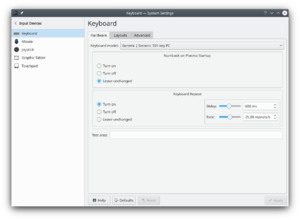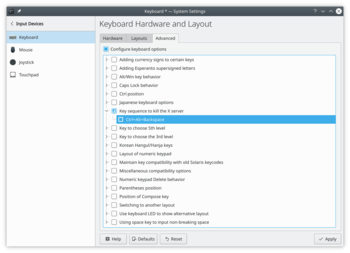System Settings/Input Devices/en: Difference between revisions
(Importing a new version from external source) |
(Importing a new version from external source) |
||
| (One intermediate revision by the same user not shown) | |||
| Line 32: | Line 32: | ||
In this section you can manage the settings for your mouse. On the <menuchoice>General</menuchoice> tab you can configure things like button handedness, and is single or double click opens icon. | In this section you can manage the settings for your mouse. On the <menuchoice>General</menuchoice> tab you can configure things like button handedness, and is single or double click opens icon. | ||
On the <menuchoice>Advanced</menuchoice> tab you can change things like | On the <menuchoice>Advanced</menuchoice> tab you can change things like how mover cursor responds to physical movement of mouse. | ||
On the <menuchoice>Mouse Navigation</menuchoice> tab you can enable moving mouse cursor with keyboard. | On the <menuchoice>Mouse Navigation</menuchoice> tab you can enable moving mouse cursor with keyboard. | ||
| Line 47: | Line 47: | ||
{{PrefIcon|Trans.png|Tablet}} | {{PrefIcon|Trans.png|Tablet}} | ||
This section allows you to configure your graphical tablet. This is an [[Wacomtablet|optional component]] that might require separate installation. | This section allows you to configure your graphical tablet. This is an [[Special:myLanguage/Wacomtablet|optional component]] that might require separate installation. | ||
[[Category:Desktop]] | [[Category:Desktop]] | ||
Latest revision as of 04:50, 14 June 2018
 |
Configuring your input devices |


Keyboard
In this section you can manage the settings for your keyboard.

Enable Control + Alt + Backspace to kill X-Server
Under tab, make sure is enabled. Then look in the list below for "Key sequence to kill the X server". Under it, you should be able to check . Once done, click on .

Enable Compose key
Compose is a feature that allows you to write any character you want, no matter the keyboard layout you are using, by pressing a certain key (Compose key) and a series of keys. You could, i.e., associate ‘~’ and ‘n’ characters so they get replaced by a ‘ñ’ character when they are pressed after pressing Compose key. There are many default key combinations, and you can customize Compose configuration file so it better fits your specific needs. You will find more information here.
To enable this feature, first make sure is enabled under tab. Then, check a key from tree. Finally, click . From now on, you will be able to use that key as Compose key.

Mouse
In this section you can manage the settings for your mouse. On the tab you can configure things like button handedness, and is single or double click opens icon.
On the tab you can change things like how mover cursor responds to physical movement of mouse.
On the tab you can enable moving mouse cursor with keyboard.

Touchpad
In this section you can manage the settings for your mouse trackpad. Settings may vary based on hardware.
Disabling touchpad is currently (KDE4.11.20) not supported on this setting-module. If you have Synaptiks package installed you can disable it with commandline command: synclient TouchpadOff=1. Also Synaptiks gui-app provides settings to manage disabling of touchpad.

Joystick
In this section you can manage the settings for your joystick.

Tablet
This section allows you to configure your graphical tablet. This is an optional component that might require separate installation.
